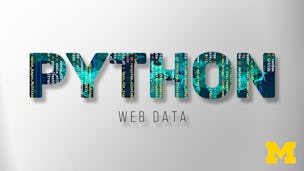En este curso, aprenderás cómo la Internet se puede convertir en una fuente de datos. Para esto, rasparemos, analizaremos y leeremos los datos web y también accederemos datos mediante APIs web. Trabajaremos con formatos de datos HTML, XML y JSON en Python. Este curso abarcará los capítulos 11-13 del libro de texto "Python for Everybody". Para tener éxito en este curso, debes estar familiarizado con el material que se incluye en los capítulos 1-10 del libro de texto y los dos primeros cursos de esta especialización. Estos temas incluyen variables y expresiones, ejecución condicional (bucles, ramificación y try/except), funciones, estructuras de datos de Python (cadenas, listas, diccionarios y tuplas) y manipulación de archivos. Este curso abarca Python 3.

Uso de Python para Acceder a Datos Web

Uso de Python para Acceder a Datos Web

Instructor: Charles Russell Severance
3,598 already enrolled
Included with
12 reviews
What you'll learn
Usar expresiones habituales para extraer datos de cadenas
Comprender los protocolos que usan los navegadores web para recuperar documentos y aplicaciones web
Recuperar datos de sitios web y APIs usando Python
Trabajar con datos XML (eXtensible Markup Language)
Skills you'll gain
Details to know

Add to your LinkedIn profile
5 assignments
See how employees at top companies are mastering in-demand skills

There are 6 modules in this course
En esta sección, instalarás Python y un editor de texto. En las clases anteriores de la especialización, esta fue una tarea opcional, pero en esta clase es el primer requisito para comenzar. A partir de este momento, dejaremos de usar el ambiente de calificación Python basado en un navegador ya que el ambiente de Python basado en un navegador (Skulpt) no es capaz de ejecutar los programas más complejos que desarrollaremos en esta clase.
What's included
6 videos5 readings2 app items
Las expresiones habituales son un lenguaje muy especializado que nos permite buscar brevemente cadenas y extraer datos de cadenas. Las expresiones habituales son un lenguaje en sí mismas. No es esencial saber usar expresiones habituales pero pueden ser bastante útiles y poderosas.
What's included
4 videos1 reading1 assignment1 app item
En esta sección aprendemos sobre los protocolos que utilizan los navegadores web para recuperar documentos y aplicaciones web para interactuar con las interfaces de programas de aplicaciones (API).
What's included
8 videos1 reading1 assignment1 app item
En esta sección aprendemos a usar Python para recuperar datos de sitios web y API a través de Internet.
What's included
8 videos1 reading1 assignment2 app items
En esta sección, aprendemos cómo recuperar y analizar datos XML (eXtensible Markup Language).
What's included
8 videos1 assignment1 app item
En este módulo, trabajamos con interfaces de programas de aplicaciones/servicios web utilizando el formato de datos Notación de objetos JavaScript (JSON).
What's included
12 videos3 readings1 assignment2 app items
Instructor

Offered by
Explore more from Software Development
- Status: Free Trial

University of Michigan
Why people choose Coursera for their career

Felipe M.

Jennifer J.

Larry W.

Chaitanya A.
Learner reviews
- 5 stars
50%
- 4 stars
33.33%
- 3 stars
0%
- 2 stars
16.66%
- 1 star
0%
Showing 3 of 12
Reviewed on May 26, 2021
Excellent!

Open new doors with Coursera Plus
Unlimited access to 10,000+ world-class courses, hands-on projects, and job-ready certificate programs - all included in your subscription
Advance your career with an online degree
Earn a degree from world-class universities - 100% online
Join over 3,400 global companies that choose Coursera for Business
Upskill your employees to excel in the digital economy
Frequently asked questions
To access the course materials, assignments and to earn a Certificate, you will need to purchase the Certificate experience when you enroll in a course. You can try a Free Trial instead, or apply for Financial Aid. The course may offer 'Full Course, No Certificate' instead. This option lets you see all course materials, submit required assessments, and get a final grade. This also means that you will not be able to purchase a Certificate experience.
When you purchase a Certificate you get access to all course materials, including graded assignments. Upon completing the course, your electronic Certificate will be added to your Accomplishments page - from there, you can print your Certificate or add it to your LinkedIn profile.
Yes. In select learning programs, you can apply for financial aid or a scholarship if you can’t afford the enrollment fee. If fin aid or scholarship is available for your learning program selection, you’ll find a link to apply on the description page.
More questions
Financial aid available,

